Ökonometrische Methoden für wirtschaftliche Prognosen und Simulationen
Der Forschungsschwerpunkt der Forschungsgruppe liegt in der Entwicklung ökonometrischer Methoden für Kurzfristprognosen (Reduzierte-Form-Modelle), für Regionalisierung und für Langfristprojektionen sowie für strukturelle Prognose- und Simulationsmodelle (DSGE-Modelle). Ferner erstellt sie ökonometrische Hintergrundanalysen für die Prognosetätigkeit der Forschungsgruppe Makroökonomische Analysen und Prognosen. Im Rahmen von Drittmittelprojekten wurden verschiedene makroökonomische Modelle, bspw. für die Volkswagen Financial Services AG oder im Rahmen von GIZ-Projekten für die Wirtschaftsministerien in Kirgistan und Tadschikistan sowie das Institut für makroökonomische Prognosen und Forschung (IFMR) in Usbekistan entwickelt.
IWH-Datenprojekt: IWH Real-time Database
Forschungscluster
Wirtschaftliche Dynamik und StabilitätIhr Kontakt

- Abteilung Makroökonomik
PROJEKTE
07.2022 ‐ 12.2026
Evaluierung des InvKG und des Bundesprogrammes STARK
Bundesministerium für Wirtschaft und Klimaschutz (BMWK)
Im Auftrag des Bundesministeriums für Wirtschaft und Klimaschutz evaluieren das IWH und das RWI die Verwendung der rund 40 Milliarden Euro, mit denen der Bund die Kohleausstiegsregionen unterstützt.
12.2024 ‐ 02.2026
Macroeconomic Modelling for Energy Investments in Vietnam
Deutsche Gesellschaft für Internationale Zusammenarbeit (GIZ) GmbH
08.2024 ‐ 03.2025
Strengthening Public Financial Management in Vietnam
Deutsche Gesellschaft für Internationale Zusammenarbeit (GIZ) GmbH
01.2023 ‐ 12.2023
Frühzeitige Ermittlung stabiler Ergebnisse zum Bruttoinlandsprodukt bzw. realen Wirtschaftswachstum und der Bruttowertschöpfung auf Länderebene
Landesbetrieb Information und Technik Nordrhein-Westfalen
Das Projekt prüft, ob die Genauigkeit der ersten Schätzung der Bruttowertschöpfung und des Bruttoinlandsprodukts für die Bundesländer erhöht und damit das Ausmaß der nachfolgenden Revisionen reduziert werden kann.
01.2018 ‐ 12.2023
EuropeAid (EU-Rahmenvertrag)
Europäische Kommission
05.2020 ‐ 09.2023
ENTRANCES: Energy Transitions from Coal and Carbon: Effects on Societies
Europäische Kommission
Ziel von ENTRANCES ist es, die Folgen des Kohleausstiegs in Europa zu untersuchen. Wie verändert der Kohleausstieg die Gesellschaft – und wie kann Politik darauf reagieren?
This project has received funding from the European Union’s Horizon 2020 research and innovation programme under grant agreement No 883947.
10.2019 ‐ 01.2023
An Klimawandel angepasste Wirtschaftsentwicklung
Deutsche Gesellschaft für Internationale Zusammenarbeit (GIZ) GmbH
Der Klimawandel wirkt sich stark auf das Wirtschaftswachstum und die Entwicklung eines Landes aus. Das erhöht den Bedarf an verlässlichen und realisierbaren Ansätzen, mit denen die Auswirkungen von Klimarisiken und potenzielle Anpassungsszenarien bewertet werden können. Die politischen Entscheidungsträger*innen in den Planungs- und Wirtschaftsministerien benötigen fundierte Prognosen, um entsprechende wirtschaftspolitische Instrumente zu konzipieren, zu finanzieren und aktiv gegenzusteuern. In den Pilotländern Kasachstan, Vietnam und Georgien werden Klimarisiken bei der makroökonomischen Modellierung berücksichtigt. Die Ergebnisse werden so in den Politikprozess integriert, dass angepasste Wirtschaftsplanungen entstehen können. Das IWH-Team ist verantwortlich für die makroökonomische Modellierung in Vietnam.
07.2016 ‐ 12.2018
Klimaschutz und Kohleausstieg: Politische Strategien und Maßnahmen bis 2030 und darüber hinaus
Umweltbundesamt (UBA)
01.2017 ‐ 12.2017
Unterstützung einer nachhaltigen Wirtschaftsentwicklung in ausgewählten Regionen Usbekistans
Deutsche Gesellschaft für Internationale Zusammenarbeit (GIZ) GmbH
01.2017 ‐ 12.2017
Short-term Macroeconomic Forecasting Model in Ministry of Economic Development and Trade of Ukraine
Deutsche Gesellschaft für Internationale Zusammenarbeit (GIZ) GmbH
01.2016 ‐ 12.2017
Entwicklung eines analytischen Tools basierend auf einer Input-Output-Tabelle
Deutsche Gesellschaft für Internationale Zusammenarbeit (GIZ) GmbH
Das Ziel des Projektes war die Entwicklung eines Exceltools zur Wirkungsanalyse von Politikmaßnahmen in Tadschikistan basierend auf dem statischen Input-Output-Ansatz.
11.2015 ‐ 12.2016
Beschäftigung und Entwicklung in der Republik Usbekistan
Deutsche Gesellschaft für Internationale Zusammenarbeit (GIZ) GmbH
Förderung einer nachhaltigen wirtschaftlichen Entwicklung in ausgewählten Regionen Usbekistans
05.2016 ‐ 05.2016
Rahmenbedingungen und Finanzierungsmöglichkeiten für die Entwicklung des Privatsektors in Tadschikistan
Deutsche Gesellschaft für Internationale Zusammenarbeit (GIZ) GmbH
02.2016 ‐ 04.2016
Makroökonomische Reformen und umwelt- und sozialverträgliches Wachstum in Vietnam
Deutsche Gesellschaft für Internationale Zusammenarbeit (GIZ) GmbH
10.2015 ‐ 03.2016
Improved Evidence-based Policy Making - GIZ Tadschikistan
Deutsche Gesellschaft für Internationale Zusammenarbeit (GIZ) GmbH
Referierte Publikationen
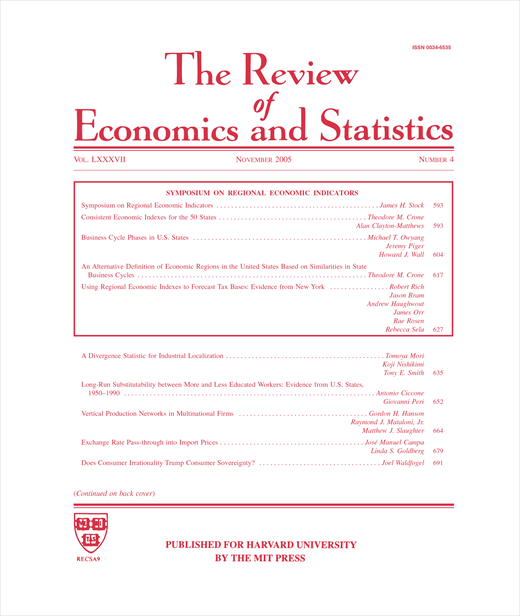
Sticky Prices or Sticky Wages? An Equivalence Result
in: Review of Economics and Statistics, im Erscheinen
Abstract
<p>We show an equivalence result in the standard representative agent New Keynesian model after demand, wage markup and correlated price markup and TFP shocks: assuming sticky prices and flexible wages yields identical allocations for GDP, consumption, labor, inflation and interest rates to the opposite case- flexible prices and sticky wages. This equivalence result arises if the price and wage Phillips curves' slopes are identical and generalizes to any pair of price and wage Phillips curve slopes such that their sum and product are identical. Nevertheless, the cyclical implications for profits and wages are substantially different. We discuss how the equivalence breaks when these factor-distributional implications matter for aggregate allocations, e.g. in New Keynesian models with heterogeneous agents, endogenous firm entry, and non-constant returns to scale in production. Lastly, we point to an econometric identification problem raised by our equivalence result and discuss possible solutions thereof.</p>

Transparency and Forecasting: The Impact of Conditioning Assumptions on Forecast Accuracy
in: Applied Economic Letters, im Erscheinen
Abstract
<p>This study investigates the impact of inaccurate assumptions on economic forecast precision. We construct a new dataset comprising an unbalanced panel of annual German GDP forecasts from various institutions, taking into account their underlying assumptions. We explicitly control for different forecast horizons to reflect the information available at the time of release. Our analysis reveals that approximately 75% of the variation in squared forecast errors can be attributed to the variation in squared errors of the initial assumptions. This finding emphasizes the importance of accurate assumptions in economic forecasting and suggests that forecasters should transparently disclose their assumptions to enhance the usefulness of their forecasts in shaping effective policy recommendations.</p>
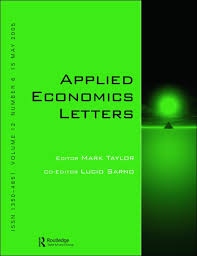
The Effects of the Iberian Exception Mechanism on Wholesale Electricity Prices and Consumer Inflation: A Synthetic-controls Approach
in: Applied Economic Letters, im Erscheinen
Abstract
<p>This study employs synthetic control methods to estimate the effect of the Iberian exception mechanism on wholesale electricity prices and consumer inflation, for both Spain and Portugal. We find that the intervention led to an average reduction of approximately 40% in the spot price of electricity between July 2022 and June 2023 in both Spain and Portugal. Regarding overall inflation, we observe notable differences between the two countries. In Spain, the intervention has an immediate effect, and results in an average decrease of 3.5 percentage points over the twelve months under consideration. In Portugal, however, the impact is small and generally close to zero. Different electricity market structures in each country are a plausible explanation.</p>
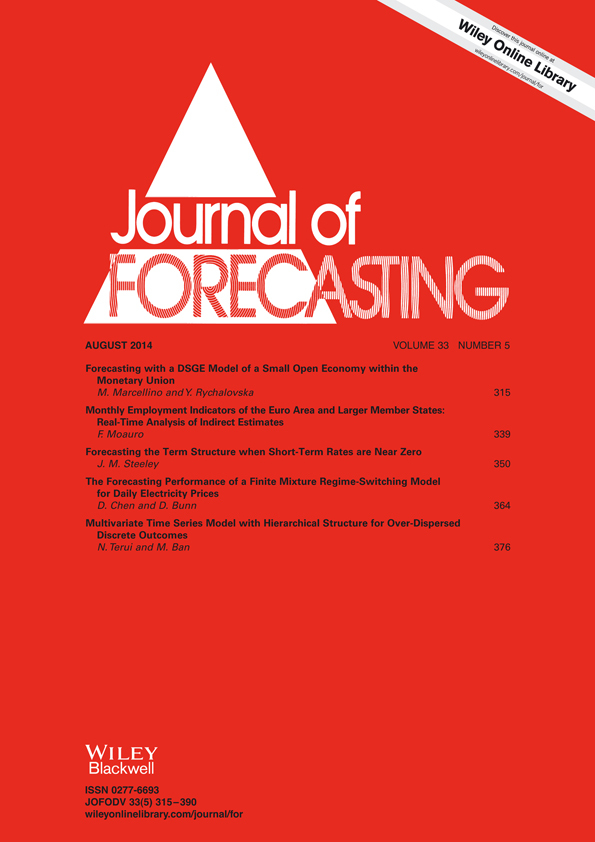
Step by Step ‒ A Quarterly Evaluation of EU Commission's GDP Forecasts
in: Journal of Forecasting, Nr. 3, 2025
Abstract
<p>The European Commission’s growth forecasts play a crucial role in shaping policies and provide a benchmark for many (national) forecasters. The annual forecasts are built on quarterly estimates, which do not receive much attention and are hardly known. Therefore, this paper provides a comprehensive analysis of multi-period ahead quarterly GDP growth forecasts for the European Union (EU), euro area, and several EU member states with respect to first-release and current-release data. Forecast revisions and forecast errors are analyzed, and the results show that the forecasts are not systematically biased. However, GDP forecasts for several member states tend to be overestimated at short-time horizons. Furthermore, the final forecast revision in the current quarter is generally downward biased for almost all countries. Overall, the differences in mean forecast errors are minor when using real-time data or pseudo-real-time data and these differences do not significantly impact the overall assessment of the forecasts’ quality. Additionally, the forecast performance varies across countries, with smaller countries and Central and Eastern European countries (CEECs) experiencing larger forecast errors. The paper provides evidence that there is still potential for improvement in forecasting techniques both for nowcasts but also forecasts up to eight quarters ahead. In the latter case, the performance of the mean forecast tends to be superior for many countries.</p>
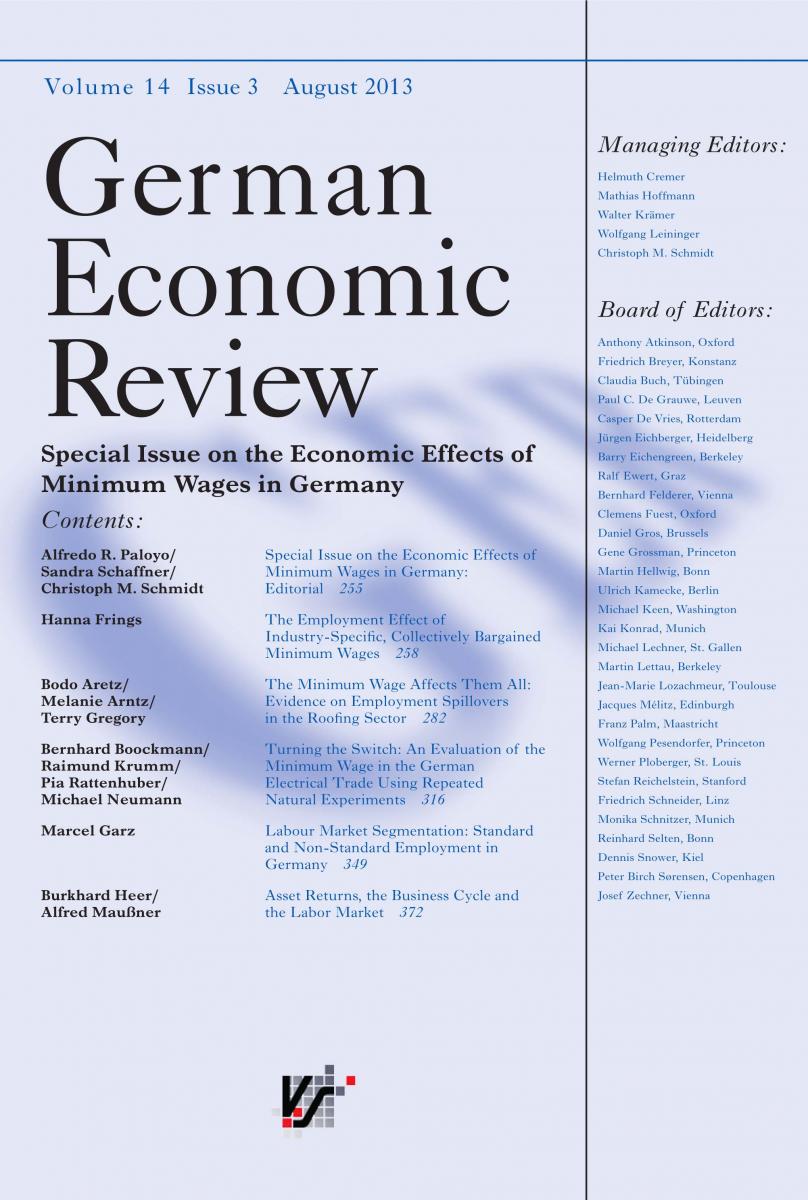
Regional Industrial Effects in Germany from a Potential Gas Deficit
in: German Economic Review, Nr. 3, 2024
Abstract
<p>We estimate potential regional industrial effects in case of a threatening gas deficit. For Germany, the reduction leads to a potential decrease in industrial value added by 1.6 %. The heterogeneity across German states is remarkable, ranging from 2.2 % for Rhineland-Palatinate to 0.7 % for Hamburg. We emphasize the need for regional input-output tables to conduct economic analysis on a sub-national level, particularly when regional industrial structures are heterogeneous. The approximation with national figures can lead to results that differ both in magnitude and relative regional exposure. Our findings highlight that more accurate policy guidance can be achieved by improving the regional database.</p>
Arbeitspapiere
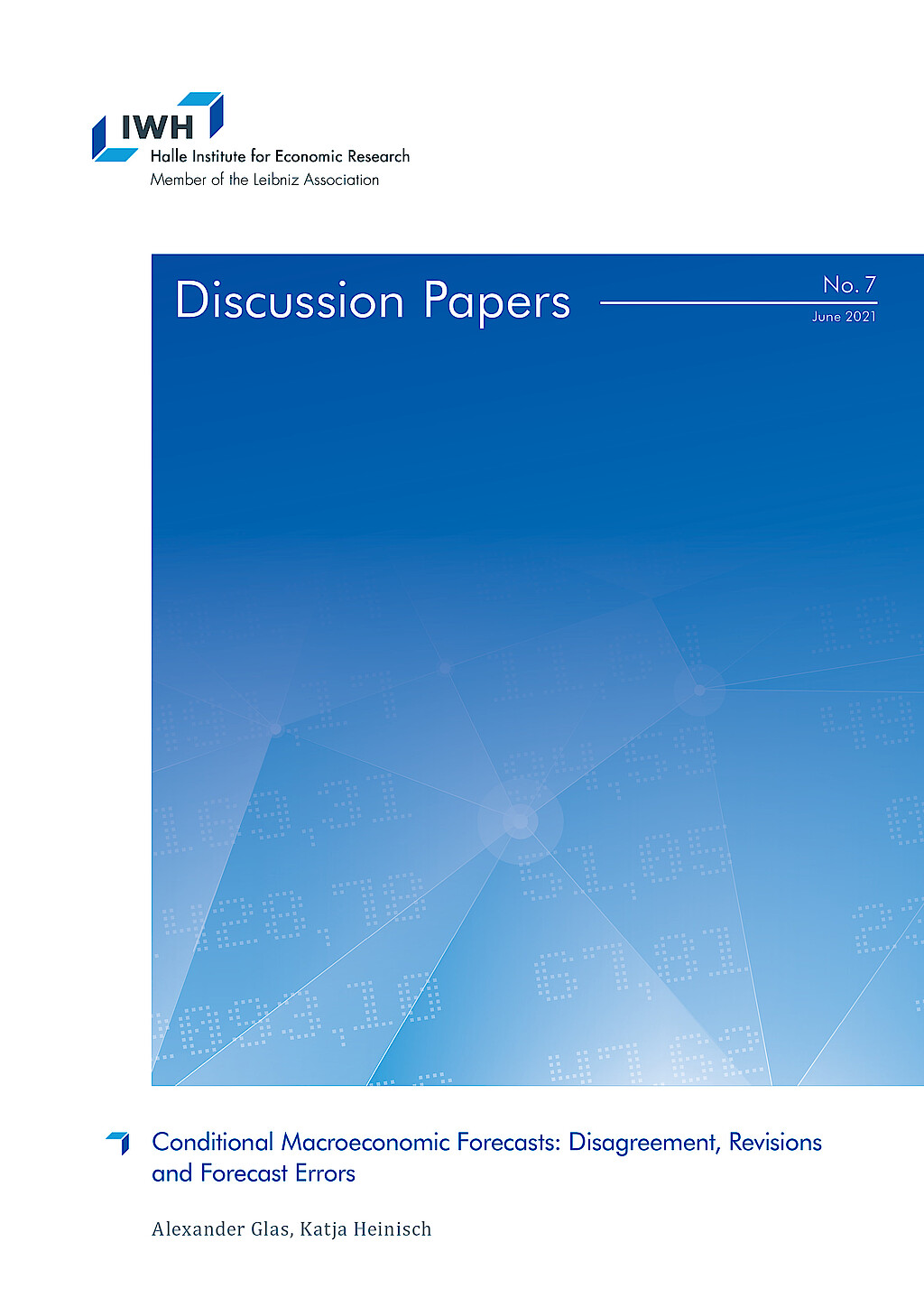
Conditional Macroeconomic Forecasts: Disagreement, Revisions and Forecast Errors
in: IWH Discussion Papers, Nr. 7, 2021
Abstract
Using data from the European Central Bank‘s Survey of Professional Forecasters, we analyse the role of ex-ante conditioning variables for macroeconomic forecasts. In particular, we test to which extent the heterogeneity, updating and ex-post performance of predictions for inflation, real GDP growth and the unemployment rate are related to assumptions about future oil prices, exchange rates, interest rates and wage growth. Our findings indicate that inflation forecasts are closely associated with oil price expectations, whereas expected interest rates are used primarily to predict output growth and unemployment. Expectations about exchange rates and wage growth also matter for macroeconomic forecasts, albeit less so than oil prices and interest rates. We show that survey participants can considerably improve forecast accuracy for macroeconomic outcomes by reducing prediction errors for external conditions. Our results contribute to a better understanding of the expectation formation process of experts.
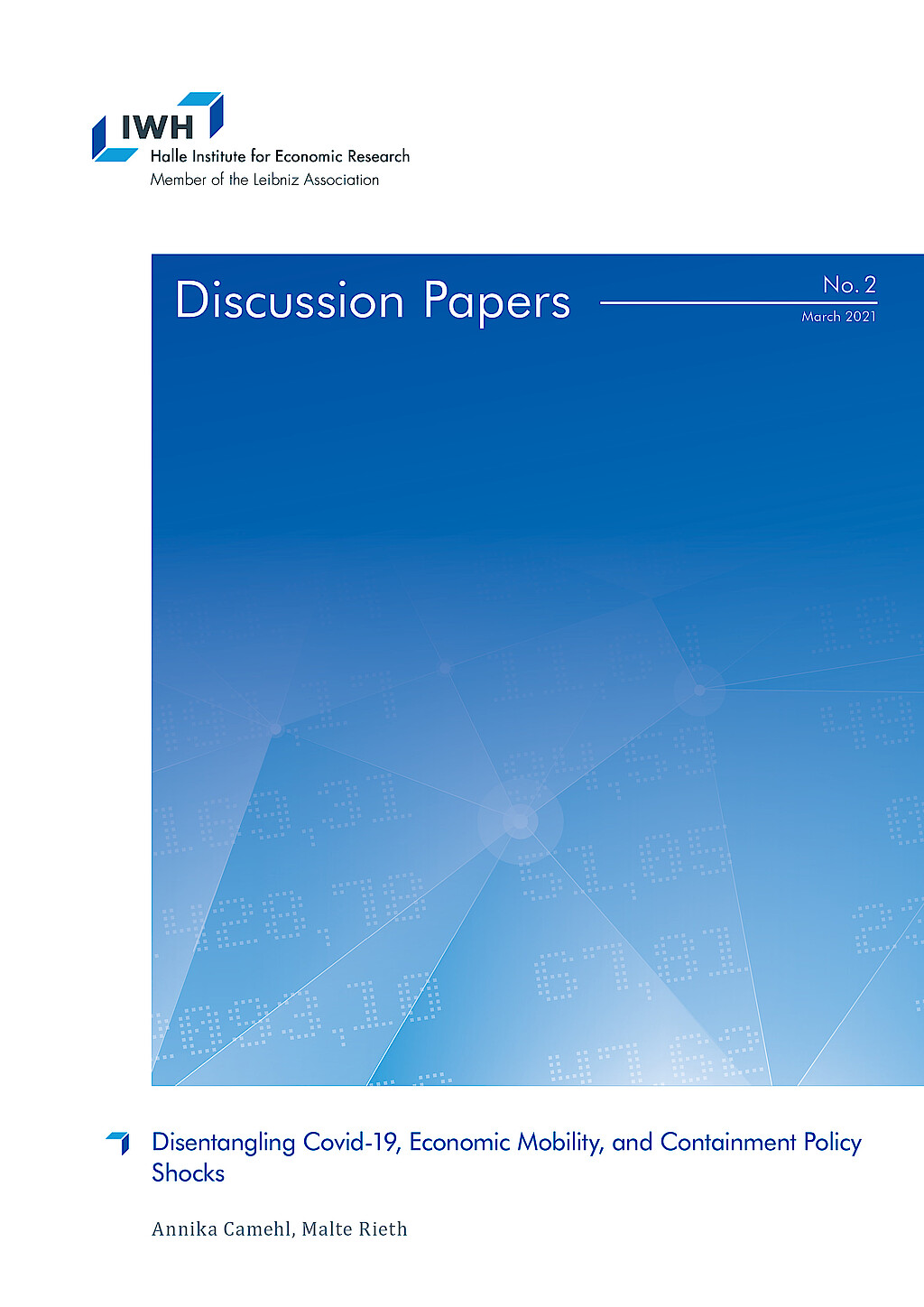
Disentangling Covid-19, Economic Mobility, and Containment Policy Shocks
in: IWH Discussion Papers, Nr. 2, 2021
Abstract
We study the dynamic impact of Covid-19, economic mobility, and containment policy shocks. We use Bayesian panel structural vector autoregressions with daily data for 44 countries, identified through sign and zero restrictions. Incidence and mobility shocks raise cases and deaths significantly for two months. Restrictive policy shocks lower mobility immediately, cases after one week, and deaths after three weeks. Non-pharmaceutical interventions explain half of the variation in mobility, cases, and deaths worldwide. These flattened the pandemic curve, while deepening the global mobility recession. The policy tradeoff is 1 p.p. less mobility per day for 9% fewer deaths after two months.
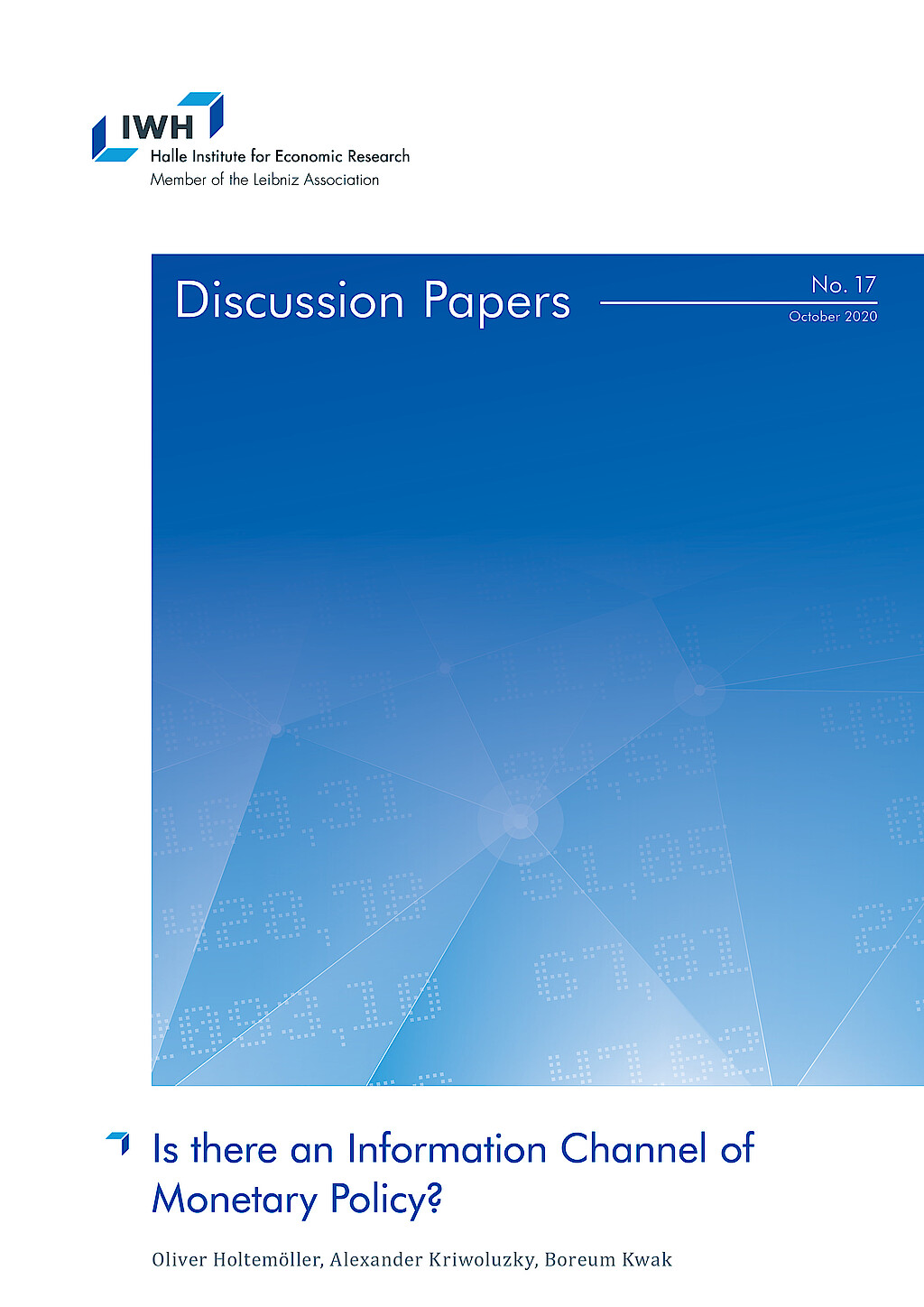
Is there an Information Channel of Monetary Policy?
in: IWH Discussion Papers, Nr. 17, 2020
Abstract
Exploiting the heteroscedasticity of the changes in short-term and long-term interest rates and exchange rates around the FOMC announcement, we identify three structural monetary policy shocks. We eliminate the predictable part of the shocks and study their effects on financial variables and macro variables. The first shock resembles a conventional monetary policy shock, and the second resembles an unconventional monetary shock. The third shock leads to an increase in interest rates, stock prices, industrial production, consumer prices, and commodity prices. At the same time, the excess bond premium and uncertainty decrease, and the U.S. dollar depreciates. Therefore, this third shock combines all the characteristics of a central bank information shock.
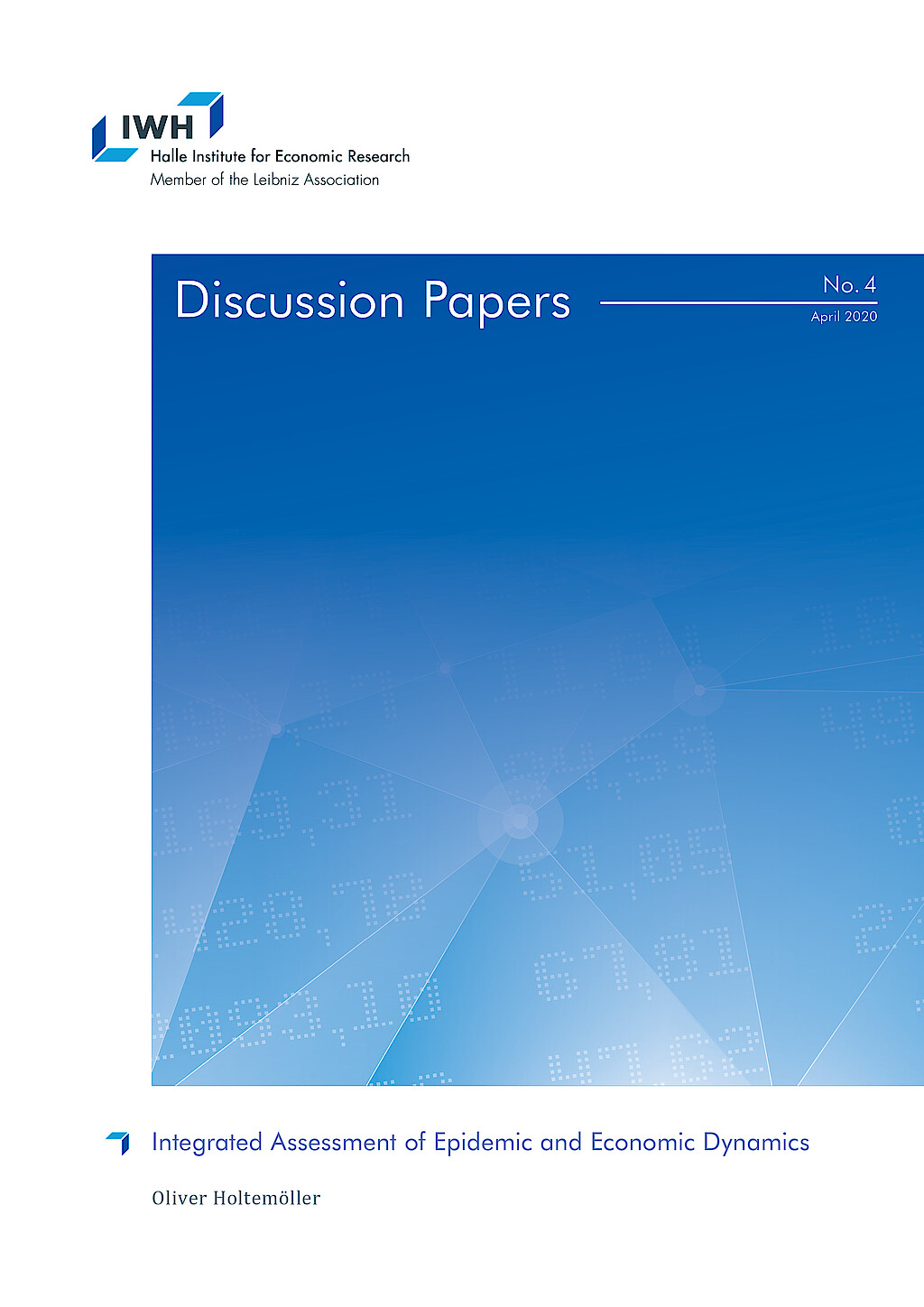
Integrated Assessment of Epidemic and Economic Dynamics
in: IWH Discussion Papers, Nr. 4, 2020
Abstract
In this paper, a simple integrated model for the joint assessment of epidemic and economic dynamics is developed. The model can be used to discuss mitigation policies like shutdown and testing. Since epidemics cause output losses due to a reduced labor force, temporarily reducing economic activity in order to prevent future losses can be welfare enhancing. Mitigation policies help to keep the number of people requiring intensive medical care below the capacity of the health system. The optimal policy is a mixture of temporary partial shutdown and intensive testing and isolation of infectious persons for an extended period of time.
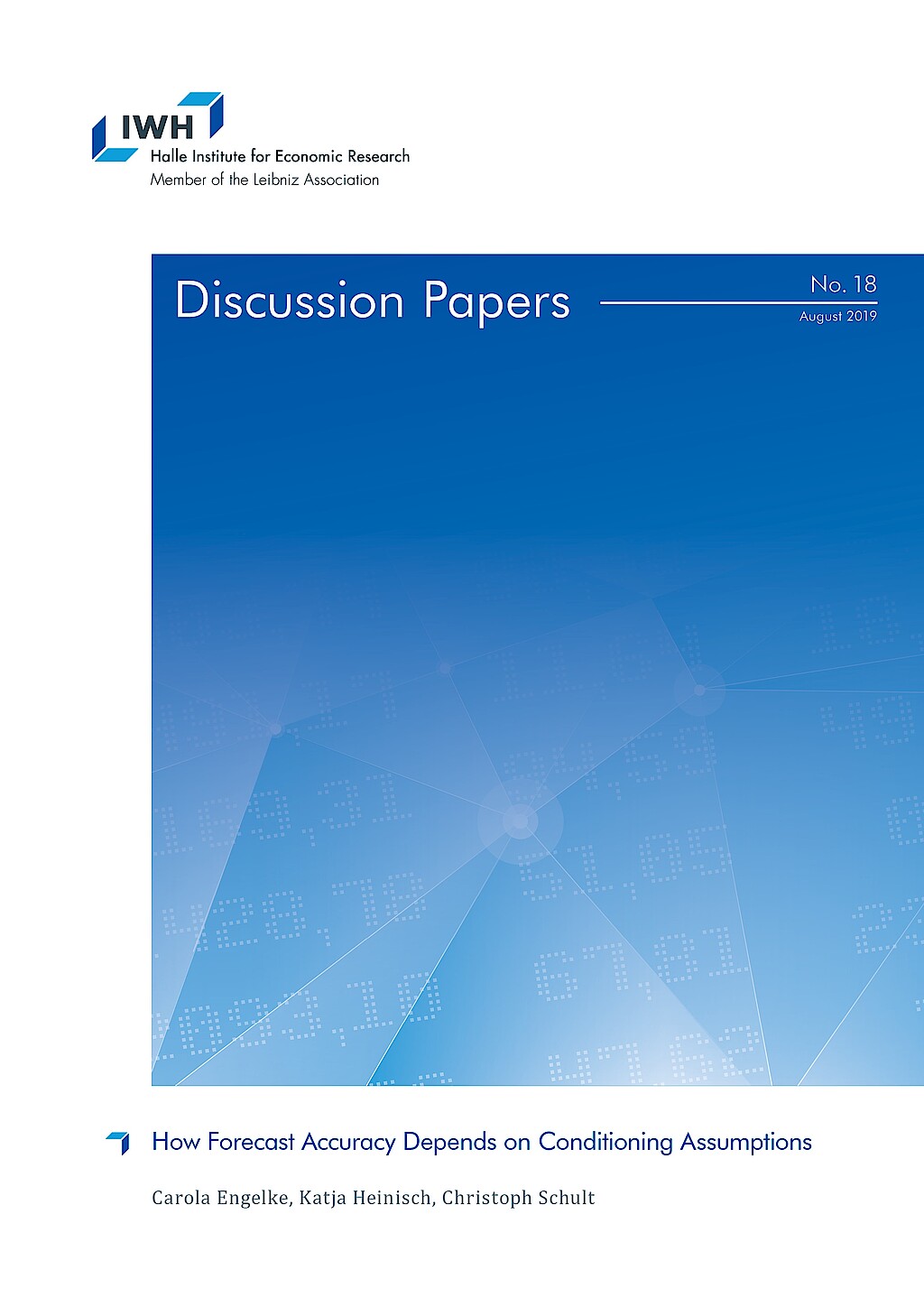
How Forecast Accuracy Depends on Conditioning Assumptions
in: IWH Discussion Papers, Nr. 18, 2019
Abstract
This paper examines the extent to which errors in economic forecasts are driven by initial assumptions that prove to be incorrect ex post. Therefore, we construct a new data set comprising an unbalanced panel of annual forecasts from different institutions forecasting German GDP and the underlying assumptions. We explicitly control for different forecast horizons to proxy the information available at the release date. Over 75% of squared errors of the GDP forecast comove with the squared errors in their underlying assumptions. The root mean squared forecast error for GDP in our regression sample of 1.52% could be reduced to 1.13% by setting all assumption errors to zero. This implies that the accuracy of the assumptions is of great importance and that forecasters should reveal the framework of their assumptions in order to obtain useful policy recommendations based on economic forecasts.


























